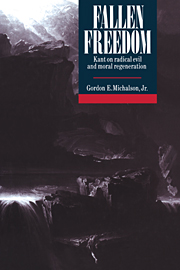5 - Moral regeneration, human autonomy, and divine aid
Published online by Cambridge University Press: 15 December 2009
Summary
And now there opens up before him the abyss of a mystery regarding what God may do…, whether indeed anything in general, and if so, what in particular should be ascribed to God.
KantSuppose we were ignorant of what God does and suppose we were convinced only of this: that, because of the holiness of His law and the insuperable evil of our hearts, God must have hidden some supplement to our deficiencies somewhere in the depth of His decrees, something we could humbly rely on, if only we should do what is in our power, so as not to be unworthy of His law. If that were so, we should have all the guidance we need, whatever the manner of communication between the divine goodness and ourselves might be.
KantOverview of the problems
However difficult it may be to explain what moral regeneration is, the difficulties are enormously compounded when we attempt to account for how it occurs. For just here Kant is delicately walking a fine line between autonomy and grace, free will and providence, appealing to the human dimension so as to have the result be a truly moral regeneration, while referring in vague but substantive ways to divine action so as to underwrite the possibility of what radical evil seems to make impossible.
- Type
- Chapter
- Information
- Fallen FreedomKant on Radical Evil and Moral Regeneration, pp. 89 - 106Publisher: Cambridge University PressPrint publication year: 1990

